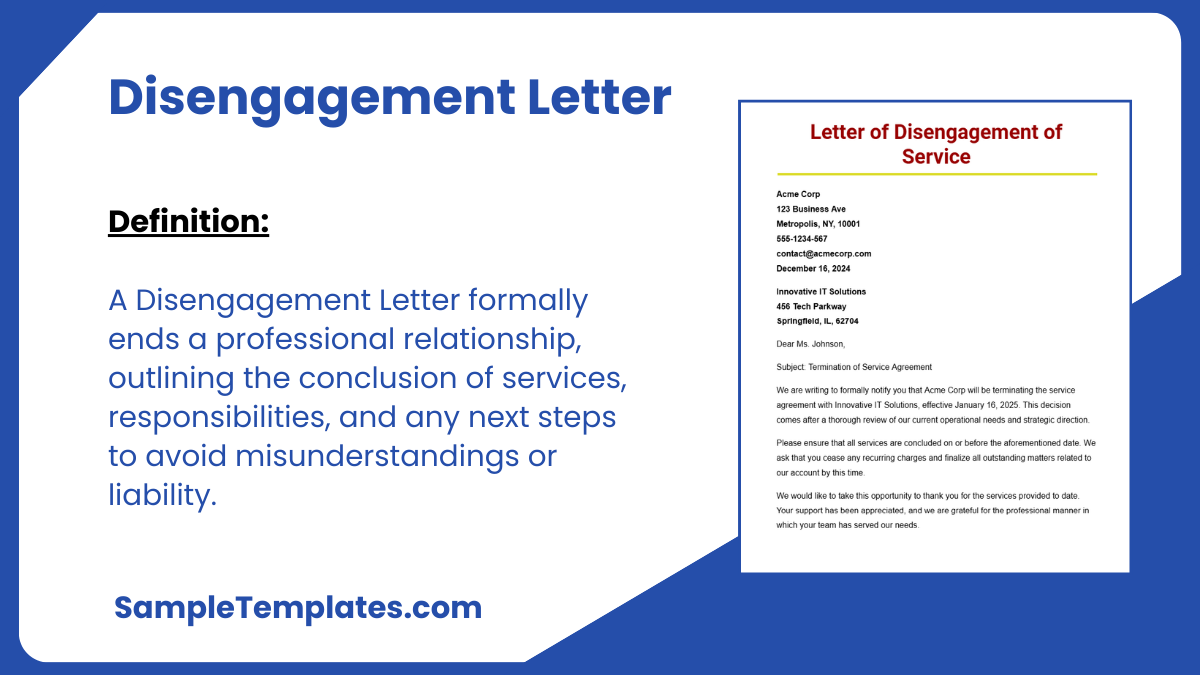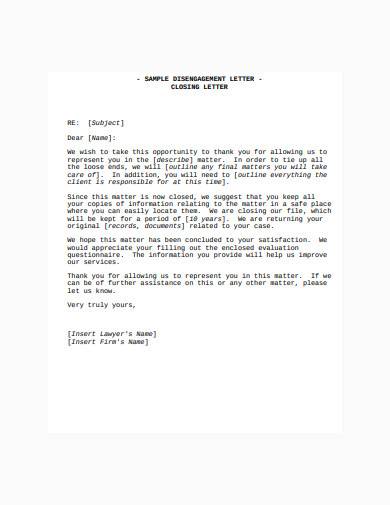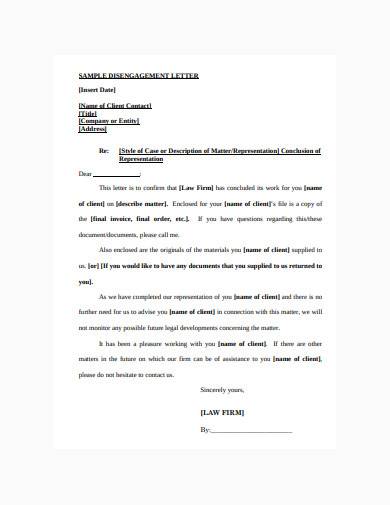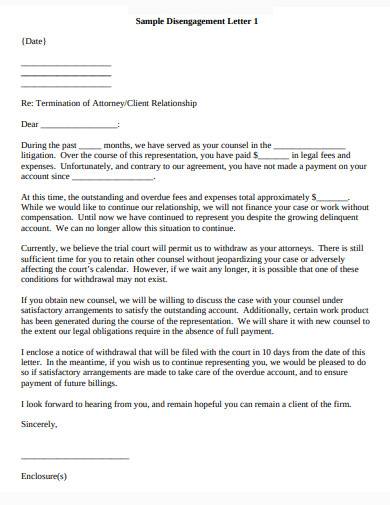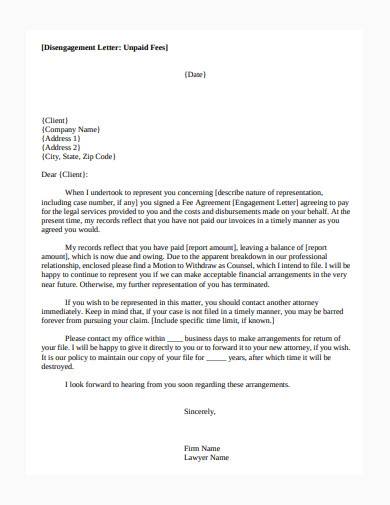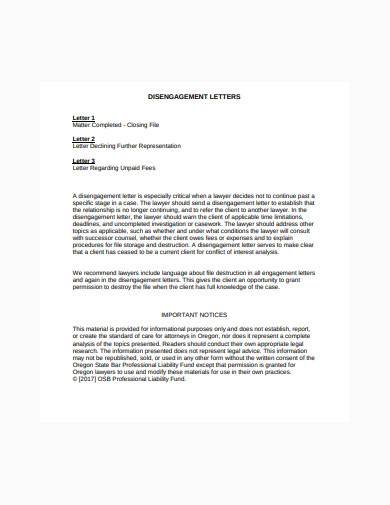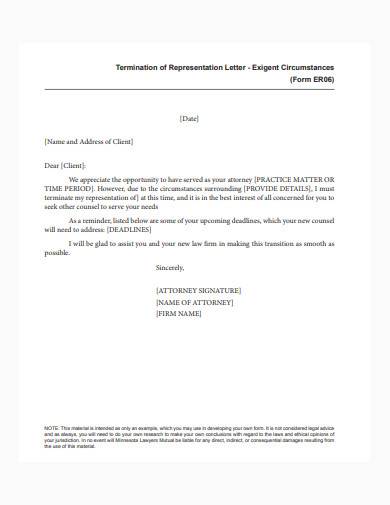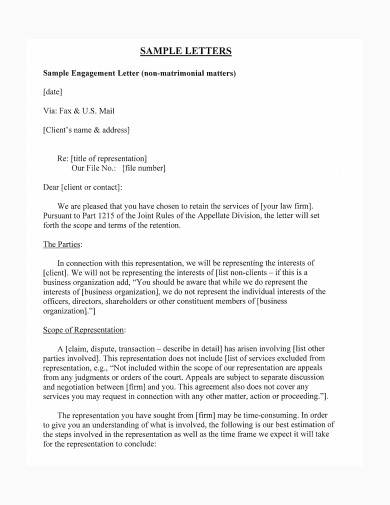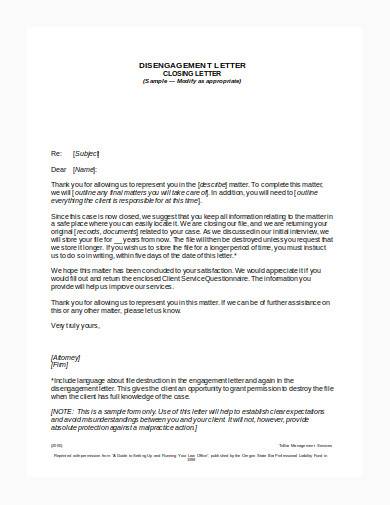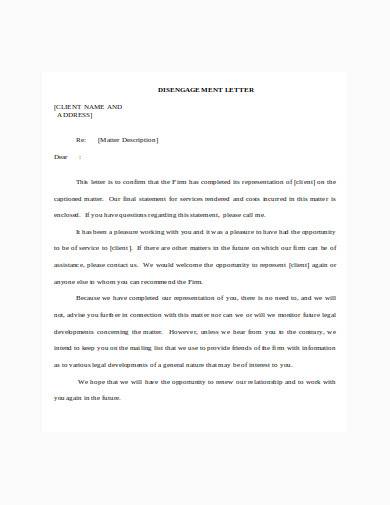As much as people want to believe in forever, some things have to come to an end. Some relationships don’t last as long as you hope it would. It’s not every day you get to find someone you have a connection with. No matter how much you work on it, things just don’t work out as planned. You just have to accept that the best thing for you is to go your separate ways. Breakups are hard, that is why some people use goodbye letters to make things easier. When it comes to business and legal affairs, official letters make the separation legitimate and documented. That’s why accountants and attorneys send disengagement letters to their clients.
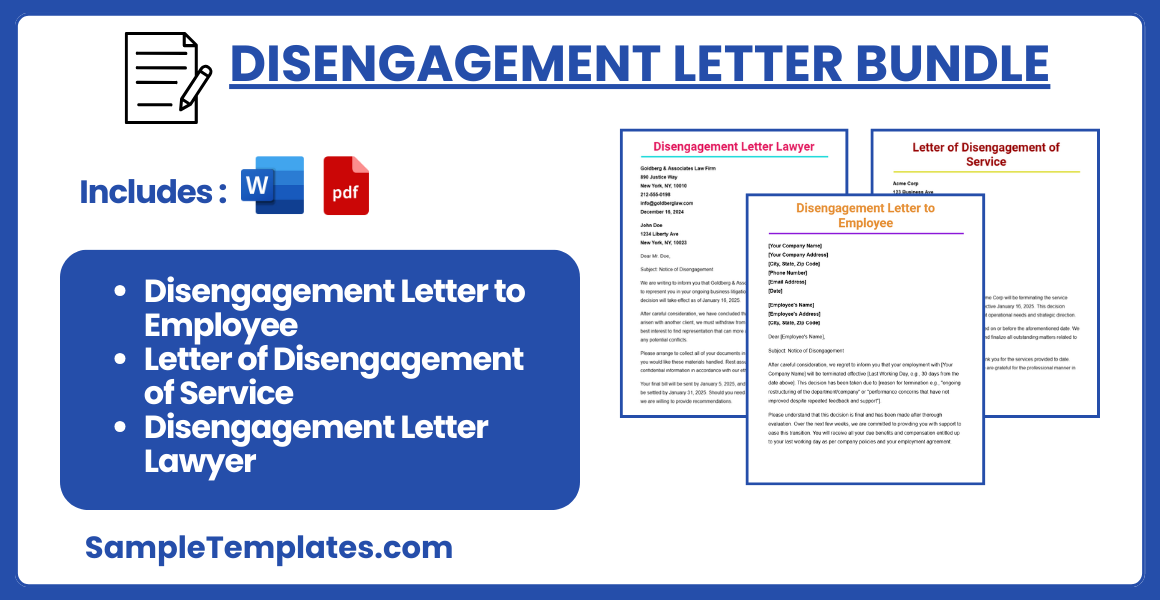
Disengagement Letter to Employee
[Your Company Name]
[Your Company Address]
[City, State, Zip Code]
[Phone Number]
[Email Address]
[Date]
[Employee’s Name]
[Employee’s Address]
[City, State, Zip Code]
Dear [Employee’s Name],
Subject: Notice of Disengagement
After careful consideration, we regret to inform you that your employment with [Your Company Name] will be terminated effective [Last Working Day, e.g., 30 days from the date above]. This decision has been taken due to [reason for termination e.g., “ongoing restructuring of the department/company” or “performance concerns that have not improved despite repeated feedback and support”].
Please understand that this decision is final and has been made after thorough evaluation. Over the next few weeks, we are committed to providing you with support to ease this transition. You will receive all your due benefits and compensation entitled up to your last working day as per company policies and your employment agreement.
Your final paycheck, including accrued leave and any other owed benefits, will be processed on your last working day. You are requested to return any company property, such as keys, documents, and equipment, before your departure.
We recommend you to reach out to our HR department by [specific date] to clear any queries regarding your final settlement and benefits. We are thankful for your contributions during your tenure here and wish you success in your future endeavors.
If you require a reference letter or any additional assistance during your transition, please feel free to contact our HR department.
Sincerely,
[Your Name]
[Your Position]
[Your Company Name]
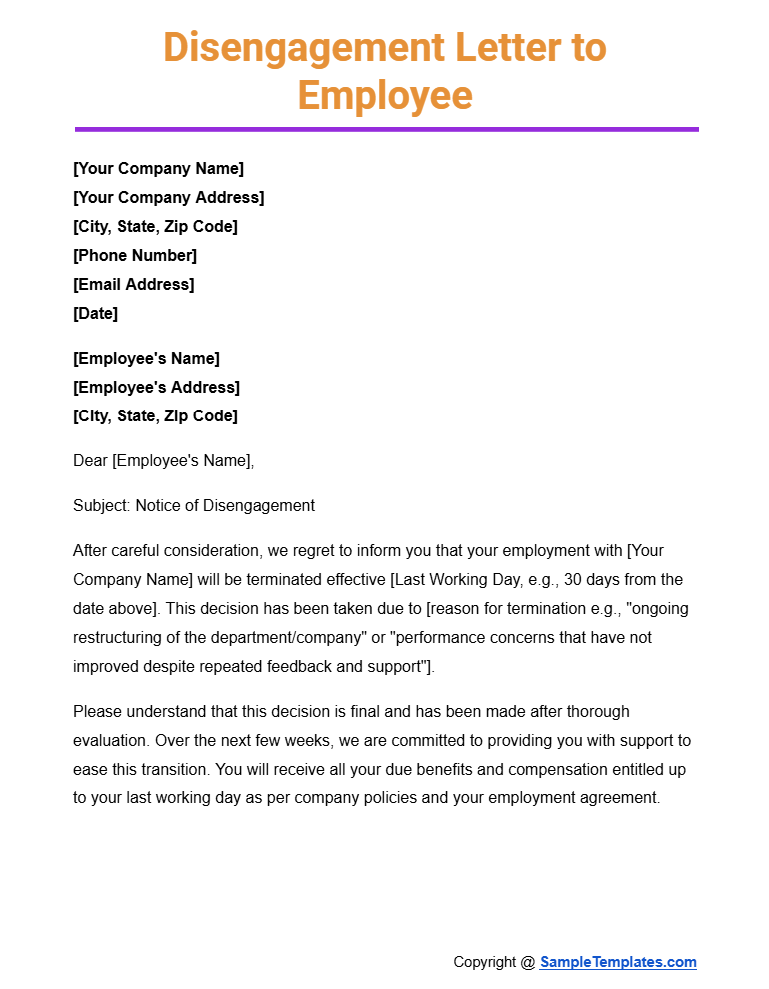
Letter of Disengagement of Service
Acme Corp
123 Business Ave
Metropolis, NY, 10001
555-1234-567
contact@acmecorp.com
December 16, 2024
Innovative IT Solutions
456 Tech Parkway
Springfield, IL, 62704
Dear Ms. Johnson,
Subject: Termination of Service Agreement
We are writing to formally notify you that Acme Corp will be terminating the service agreement with Innovative IT Solutions, effective January 16, 2025. This decision comes after a thorough review of our current operational needs and strategic direction.
Please ensure that all services are concluded on or before the aforementioned date. We ask that you cease any recurring charges and finalize all outstanding matters related to our account by this time.
We would like to take this opportunity to thank you for the services provided to date. Your support has been appreciated, and we are grateful for the professional manner in which your team has served our needs.
Kindly provide us with a final invoice by January 9, 2025, and ensure that any company property or materials in your possession are returned no later than the last day of service.
Should you have any questions regarding this termination or the process of concluding our affairs, please feel free to contact John Doe at 555-1234-567 or j.doe@acmecorp.com.
We wish you and your company the best in your future endeavors and hope that we can part ways on amicable terms.
Sincerely,
Jane Smith
Operations Manager
Acme Corp
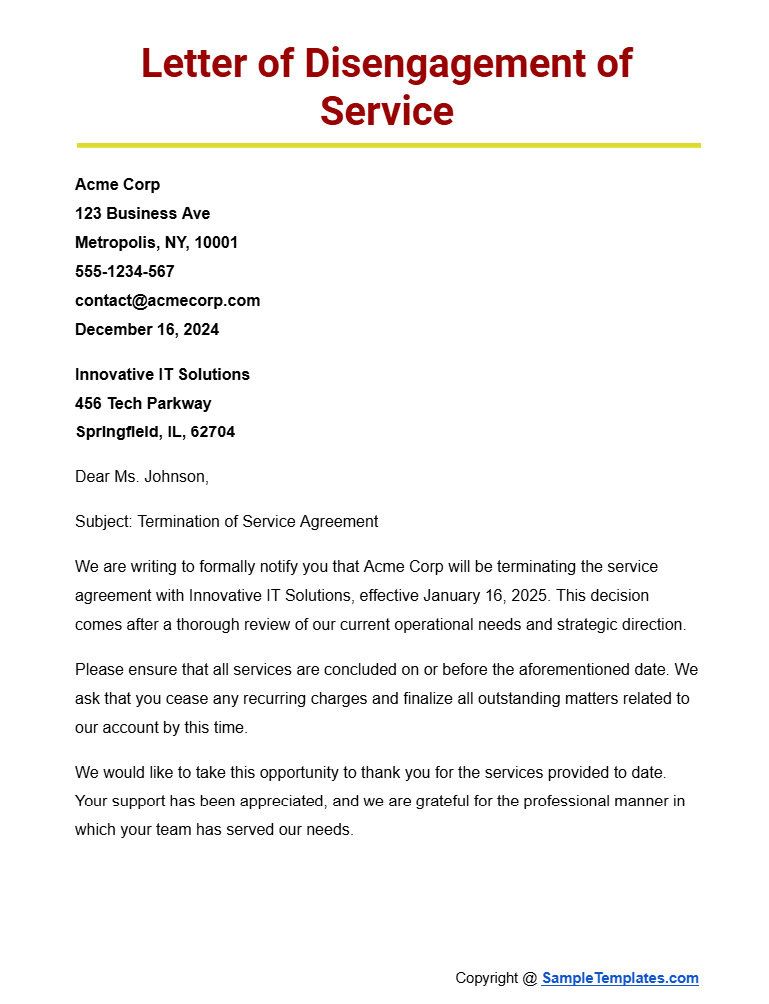
Disengagement Letter Lawyer
Goldberg & Associates Law Firm
890 Justice Way
New York, NY, 10010
212-555-0198
info@goldberglaw.com
December 16, 2024
John Doe
1234 Liberty Ave
New York, NY, 10023
Dear Mr. Doe,
Subject: Notice of Disengagement
We are writing to inform you that Goldberg & Associates Law Firm will no longer be able to represent you in your ongoing business litigation against ABC Corporation. This decision will take effect as of January 16, 2025.
After careful consideration, we have concluded that due to a conflict of interest that has arisen with another client, we must withdraw from your case. We believe it is in your best interest to find representation that can more appropriately meet your needs without any potential conflicts.
Please arrange to collect all of your documents in our possession or let us know how you would like these materials handled. Rest assured, we will maintain all your confidential information in accordance with our ethical obligations.
Your final bill will be sent by January 5, 2025, and we ask that all outstanding invoices be settled by January 31, 2025. Should you need assistance locating another attorney, we are willing to provide recommendations.
Thank you for the opportunity to serve you. If you have any questions or need further assistance, please do not hesitate to contact our office at 212-555-0198.
We wish you the best in your future legal endeavors.
Sincerely,
Elizabeth Goldberg
Partner
Goldberg & Associates Law Firm
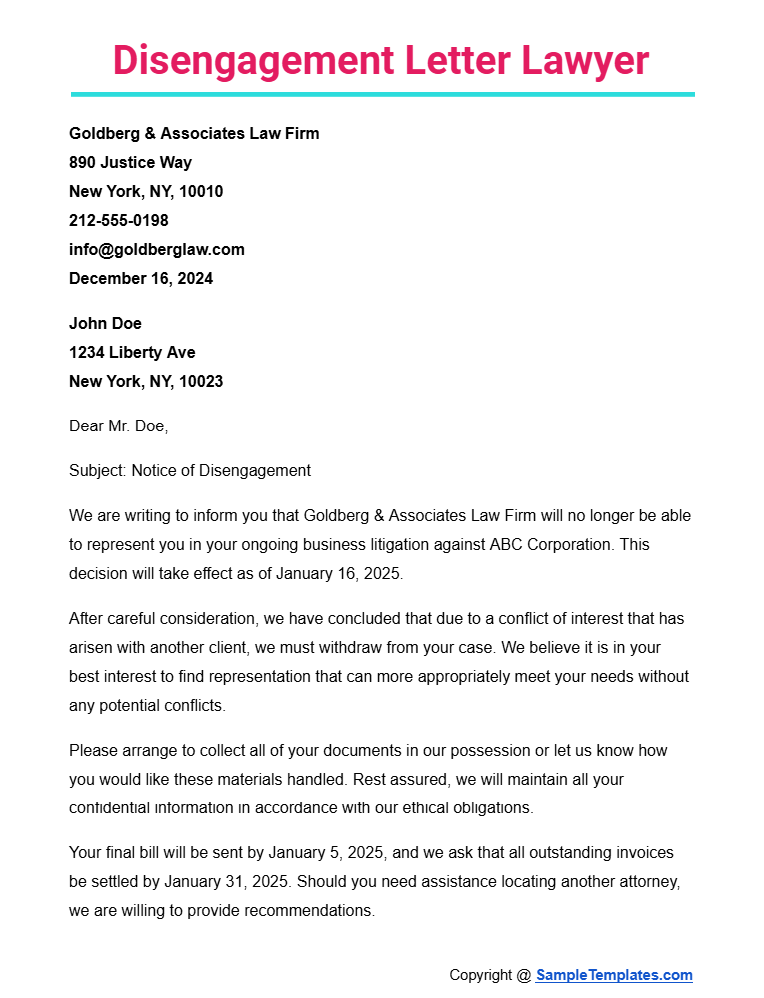
Browse More Templates On Disengagement Letter
Diving into Disengagement Letters
When the relationship agreement between the client and the service provider ends, proper documentation must be observed. When a certified public accountant or lawyer wants to end the relationship, they must send their clients a disengagement letter. A legal letter is what you use to notify your clients that you will no longer be working with them and that your relationship has officially ended. Depending on how things were between the letter sender and the client, the content could mean different things. If things ended nicely, the letter could go like, “it was a pleasure working with you.” But if things didn’t go so well, this could be a CYA letter. This letter also serves as a tool for CPAs and attorneys to reduce general liability.
Inclusions of a Disengagement Letter
Letter sending is a form of communication that people have been using since the time of ancient Mesopotamia. As time flew by, the format and content of letters also changed. When a message is between two professionals, it should obviously follow a professional letter format. But other than the composition, the content of your letter should only consist of things relating to your professional relationship. Here are some parts you should have in your disengagement letter.
Dates and Deadlines
Since your letter serves as the termination letter, having the exact date of termination would be necessary. If you signed any contract, you should include the date the deal ends in your letter. This makes any transaction after said dates invalid. If there are documents that need submitting, you should also inform your clients about the deadlines. If any legal struggle happens after these dates, you can be sure that you have something to show to avoid more liability.
Advice
Even when things have ended, that doesn’t mean you should stop giving a helping hand. Your clients don’t know all the processes, so giving out a few pieces of advice could mean so much. If you are an accountant, you can probably predict if your client’s finances will go through some rough waters. You can give them some tips if ever unwanted situations occur. You can even give them names of people to run to when they need help.
Wishes and Invitations
After every relationship, you don’t want to be that guy who thinks negatively about the other person. It’s always best to end things on a positive note. In your disengagement letter, you should include your well-wishes for your former client. This part can also be where you can invite them to come to you again for any other legal or financial transactions. This could be your gateway to getting new clients and luring former clients back to for your services.
Not every partnership lasts a long time. Some are only as long as the contract requires. It’s inevitable for accountants and attorneys to want to terminate the service of representation for some clients. One of the most practical ways to get the relationship discontinued is through a disengagement letter. This kind of letter is extremely formal, so you need to get it right. Not only does it serve as a method of communication, but it also acts as the official document for the termination of the basic agreement. To give you more insight on what disengagement letters are, here are 10+ disengagement letter samples you should check out.
1. Disengagement Letter Format Sample
2. Sample Disengagement Letter
3. Disengagement Closing Letter Template
How to Write a Letter of Disengagement?
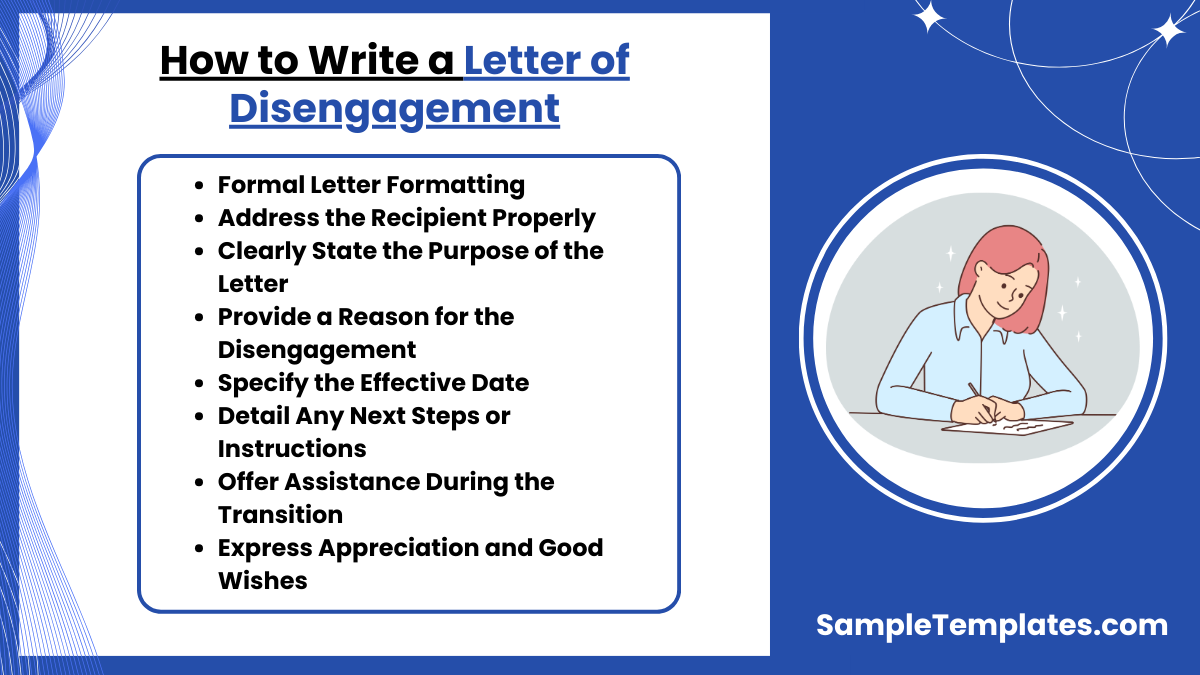
- Start with Formal Letter Formatting:
- Use your professional letterhead if available.
- Include your contact information, the date, and the recipient’s name and address.
- Address the Recipient Properly:
- Use a formal salutation, such as “Dear [Recipient’s Name],” ensuring you address the recipient by their correct title and name.
- Clearly State the Purpose of the Letter:
- Begin the body of the letter by directly stating that the letter is to notify the recipient of the disengagement. Specify the nature of the disengagement (e.g., legal services, consulting services).
- Provide a Reason for the Disengagement:
- Explain why you are ending the relationship. Be clear but professional and respectful, whether it’s due to the conclusion of the agreed services, a strategic business decision, or other reasons.
- Specify the Effective Date:
- Clearly mention when the disengagement will take effect. Give enough notice according to any contractual agreements or industry standards.
- Detail Any Next Steps or Instructions:
- Include any necessary actions the recipient needs to take or what they can expect from you. This might involve finalizing payments, returning property, or transferring files.
- Offer Assistance During the Transition:
- If applicable, offer to assist with the transition, whether through providing recommendations for replacement services or facilitating a smooth turnover of responsibilities.
- Express Appreciation and Good Wishes:
- Thank the recipient for their time and collaboration. Wish them well in their future endeavors, maintaining a tone of goodwill to preserve a positive relationship.
4. Disengagement Letter in PDF
5. Client Disengagement Letter Sample
How Do You Politely Disengage a Client?
- Communicate Clearly and Professionally:
- Use clear, straightforward language in your communication. Explain the reasons for disengagement in a professional manner, avoiding any emotional language or personal criticism.
- Provide Sufficient Notice:
- Give the client ample notice before terminating the services, based on the terms outlined in your contract or industry standards. This allows the client time to arrange for alternative services and ensures a seamless transition.
- Explain the Reason for Disengagement:
- Provide a clear and honest reason for ending the relationship, whether it’s due to strategic realignment, changes in company policy, conflicts of interest, or the end of a project. Being transparent helps maintain trust and understanding.
- Offer to Assist with the Transition:
- If appropriate, offer to help the client transition to a new provider. This could involve providing referrals, assisting with handovers, or supplying necessary documentation to ensure continuity.
- Express Gratitude:
- Thank the client for their business and the opportunity to work together. Acknowledging the value of the relationship even as it ends can leave a lasting positive impression.
- Keep the Door Open:
- Unless the disengagement is due to irreconcilable differences, let the client know that you are open to future opportunities to work together. This keeps the relationship cordial and can lead to potential collaborations later.
6. Disengagement Letter Sample
7. General Disengagement Letter Template
Purpose of Disengagement Letter
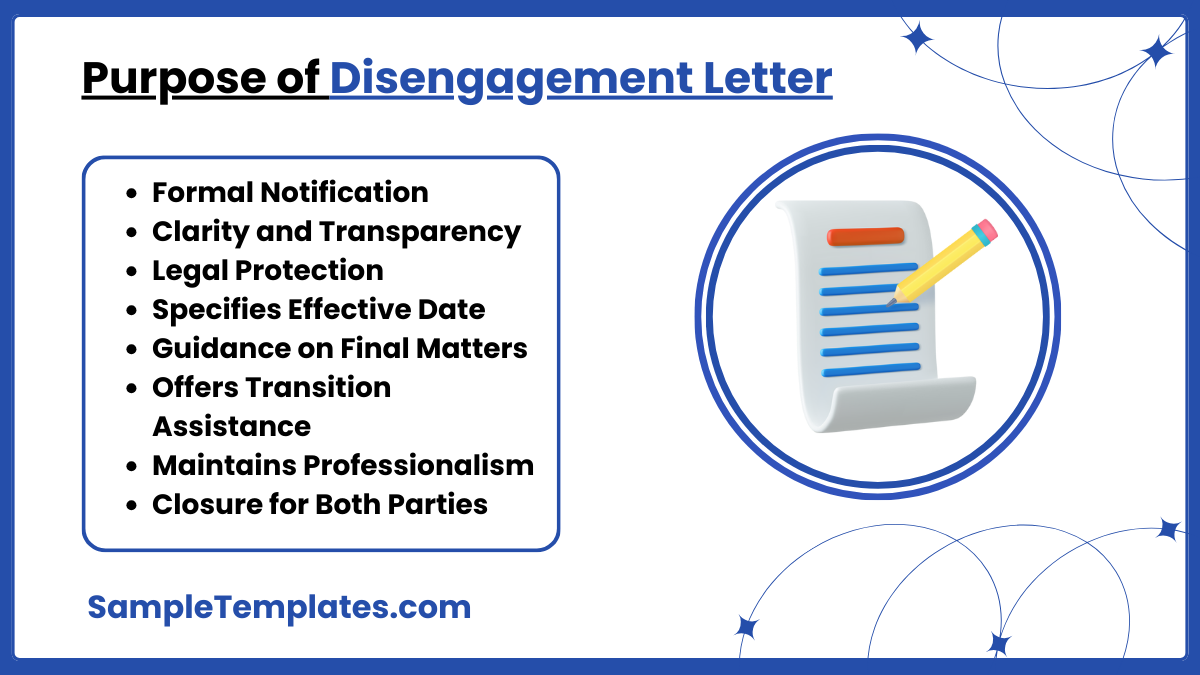
- Formal Notification:
- Provides a formal notice of termination of services or a professional relationship, ensuring that all parties are clearly informed.
- Clarity and Transparency:
- Explains the reasons for the disengagement, ensuring transparency in the decision-making process which helps in maintaining trust and professionalism.
- Legal Protection:
- Serves as a written record that can help protect both parties legally, clarifying that all contractual obligations are being concluded properly.
- Specifies Effective Date:
- Clearly states the effective date of termination, allowing all parties to prepare for the transition and arrange their affairs accordingly.
- Guidance on Final Matters:
- Outlines the steps to be taken to close out any outstanding issues, such as final payments, the return of property, or completion of pending tasks.
- Offers Transition Assistance:
- Indicates any support the sender is offering to facilitate a smooth transition, such as assistance with transferring to a new provider or helping with final tasks.
- Maintains Professionalism:
- Helps to end the relationship on a professional note, preserving the dignity and respect of both parties, which is beneficial for maintaining a good reputation.
- Closure for Both Parties:
- Provides a sense of closure, allowing both the provider and the client to formally acknowledge the end of their engagement and move forward without ambiguity.
8. Formal Disengagement Letter Sample
9. Basic Disengagement Letter Template
Tips for Writing a Disengagement Letter?
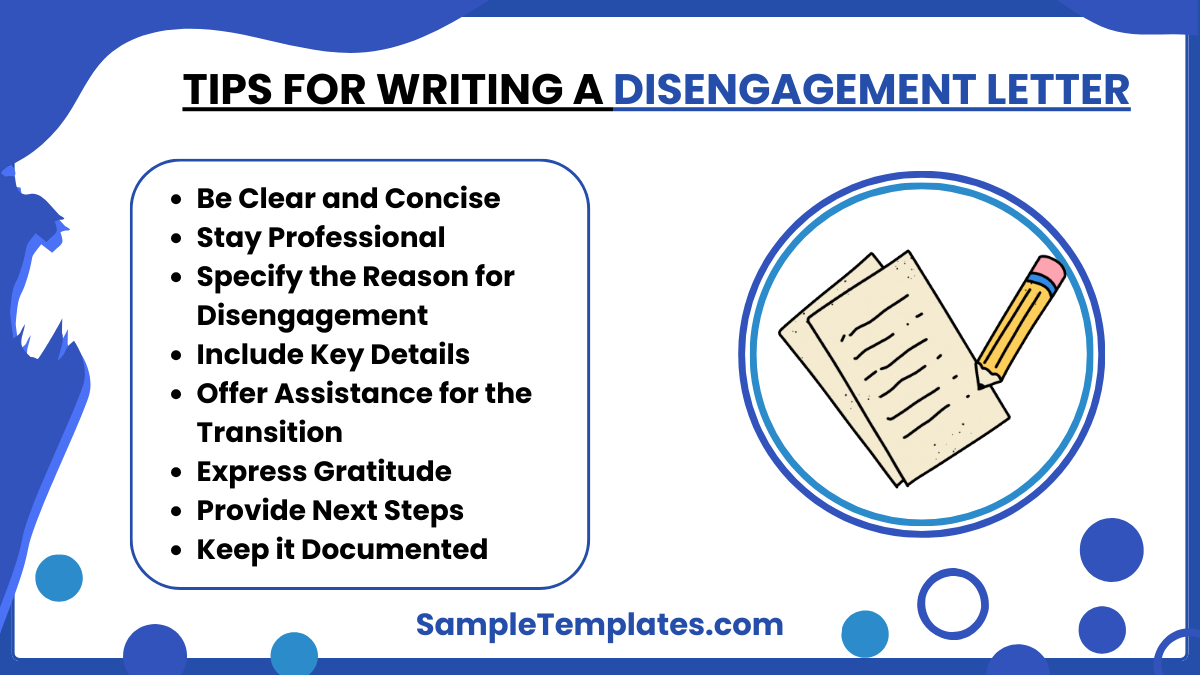
- Be Clear and Concise:
- Use straightforward language to ensure that the message is easily understandable. Avoid legal jargon unless necessary, and clearly state the purpose of the letter in the opening paragraph.
- Stay Professional:
- Maintain a professional tone throughout the letter. Even if the disengagement is due to negative circumstances, keep the communication respectful and neutral.
- Specify the Reason for Disengagement:
- Provide a clear reason for the termination of the relationship. This could be due to contract completion, business strategy changes, or other professional reasons. Avoid overly personal or detailed explanations that could lead to misunderstandings.
- Include Key Details:
- Mention important details such as the effective date of disengagement, any outstanding obligations, and final invoice information. This helps ensure that both parties are on the same page and can plan accordingly.
- Offer Assistance for the Transition:
- If appropriate, offer help during the transition period. This could involve assisting with finding a new service provider or providing support during the handover process.
- Express Gratitude:
- Thank the recipient for their collaboration or partnership. Acknowledging the positive aspects of the relationship can help end things on a good note.
- Provide Next Steps:
- Outline any actions required by the recipient, such as final payments, returning of property, or other necessary steps to formally conclude the relationship.
- Keep it Documented:
- Send the disengagement letter via a method that provides proof of delivery, such as certified mail or email with a read receipt. This documentation is important for maintaining records and can be crucial in the event of a dispute.
10. Disengagement Letter in DOC
11. Simple Disengagement Letter Example
How do you politely disengage a client?
Clearly explain the reason, provide sufficient notice, offer transition assistance, express gratitude for their business, and maintain professionalism throughout the communication.
How do you politely disengage?
Communicate clearly, provide a valid reason, give appropriate notice, thank them for the opportunity, and offer assistance during the transition period.
How do I disengage a client?
Clearly state reasons for disengagement, provide necessary transition information, ensure all services are completed, and express appreciation for past business.
What do you say to a disengaged employee?
Address concerns directly, express willingness to understand their perspective, offer support for improvement, and discuss potential solutions to re-engage.
Related Posts
Different Types of Resignation Letters
7+ Sample Personal Recommendation Letters
FREE 7+ Financial Aid Appeal Letters
21+ Sample Notice Letters
7+ Sample Personal Recommendation Letters
FREE 7+ Financial Aid Appeal Letters
29+ Requisition Letter Formats
21+ Sample Notice Letters
10+ Sample Event Proposal Letters
9+ Sample Formal Thank You Letters
9+ Sample Letter of Intent to Purchases
34+ Business Proposal Letters
28+ Letter of Recommendation Samples
FREE 17+ Sample Proposal Letter Templates
10+ Sample Event Proposal Letters
